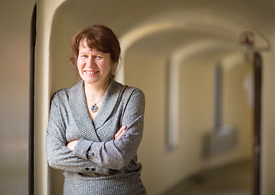After moving to the United States more than 18 years ago, Rita Barvinok uses her interest in theater to keep closely connected to her Russian roots.
“Some of my friends with little children and I wanted to keep the Russian language alive, and do something educational with our children,” says Barvinok, a system administrator in LSA Biology who originally is from Belarus.

Photo by Austin Thomason, Michigan Photography.
Barvinok’s friend suggested they conduct a play in Russian. This is how the Russian Club was born, and ever since, she has run the theater and put on more than 30 plays in the last 16 years. “I had never done a play before, but when we did it for the first time, I realized how wonderful it was. I just knew how to do plays,” she says.
Starting with small children’s stories like “Pinocchio” and “Winnie the Pooh,” the plays eventually moved towards full-length plays. “Our first real play, was ‘Ivan Vasilievich’ by Mikhail Bulgakov and then we did other Russian writers such as Gogol, Chekhov and Pushkin, as well as Shakespeare, Bernard Shaw and Edmond Rostand,” says Barvinok, who also designs props, make costumes and choreographs dances for the plays.
Barvinok also helped create the Russian ABC School in Ann Arbor, where children can be immersed in the Russian language at a young age. “It is a Saturday school, and we teach children starting at the age of 2 about language, literature, history, culture and some math, all in Russian. We have theater there as well,” she says.
Barvinok now is among the teachers educating the children. She leads a seminar on Russian history and culture, which aims to make students interested in the subject and to build a foundation on which students will be able to continue their own education. Barvinok incorporates many novels, poems, songs and paintings in her class.
The pleasure Barvinok receives from teaching children about their Russian heritage though, comes in the simplest form, such as when her son recognized that Russian music being played on the television show “The Simpsons.” “I wanted to have a common language with my children, to have them know Russia and the culture. The satisfaction is overwhelming,” she says.
Barvinok doesn’t just work behind the scenes when she is producing a play, but also in her work at U-M. Working as a system administrator, she constantly helps to ensure computers are updated, and new software is installed.
At U-M she provides installation, maintenance, and software support as well as database and Web application development in LSA Biology.
In addition to working to support computers, Barvinok, who is trained in programming, also helps to write scripts for online applications, databases and webservers.
Similar to writing plays, and learning other languages, “writing (computer) script is like another language with special syntaxes embedded into it,” Barvinok says.
“Right now we’re doing an online recruitment system for open jobs, so I write the database for them. For example, if you go to a website to send an application, the data you insert on that application has to be sent somewhere, and I take care of that,” she says.
The weekly Spotlight features faculty and staff members at the university. To nominate a candidate, please contact the Record staff at [email protected].

